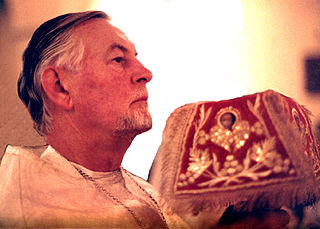Ein Zitat von John Calvin
Die Rechtfertigung durch den Glauben ist der Dreh- und Angelpunkt aller wahren Religionen.
Verwandte Zitate
Ich fürchte, dass die heute in den Vereinigten Staaten von Amerika vorherrschende Rechtfertigungsdoktrin nicht die Rechtfertigung allein durch den Glauben ist. Es handelt sich nicht einmal um eine Rechtfertigung durch gute Werke oder durch eine Kombination aus Glauben und Werken. Die in unserer heutigen Kultur vorherrschende Vorstellung von Rechtfertigung ist die Rechtfertigung durch den Tod. Um in die ewigen Arme Gottes aufgenommen zu werden, muss man nur sterben.
Ich möchte die Religion nicht mit ihren Vorteilen für uns rechtfertigen. Ich glaube, dass es unter dem Strich auch viele schlechte Dinge bewirkt – enorm viel. Aber ich glaube nicht, dass die endgültige Rechtfertigung der Religion darin besteht, dass sie den Menschen etwas Gutes tut. Ich denke, die letzte Rechtfertigung ist, dass es wahr ist und dass die Wahrheit Vorrang vor Konsequenzen hat. Religion hilft uns, mit dem umzugehen, was für den menschlichen Geist am wichtigsten ist: Werte, Bedeutung, Zweck und Qualität.
Der selige Paulus argumentiert, dass wir durch den Glauben gerettet werden, der seiner Meinung nach nicht von uns, sondern als Geschenk Gottes stammt. Daher kann es unmöglich wahre Erlösung geben, wenn es keinen wahren Glauben gibt, und da dieser Glaube göttlich ermöglicht wird, wird er zweifellos durch seine freie Großzügigkeit verliehen. Wo wahrer Glaube durch wahren Glauben herrscht, geht mit Sicherheit auch wahre Erlösung einher. Wer vom wahren Glauben abweicht, wird die Gnade der wahren Erlösung nicht besitzen.
Jede Religion, die eine bestimmte Gruppe von Menschen zum Vergnügen, zur Vergrößerung oder zum Vorteil eines anderen opfert, ist keine Religion. Es ist eine Sache, die erlaubt sein mag, aber sie verstößt gegen die wahre Religion. Jede Religion, die Frauen der Brutalität von Männern opfert, ist keine Religion.
Unser gesamter Standpunkt als Mitglieder der Kirche Jesu Christi der Heiligen der Letzten Tage beruht auf der Gültigkeit dieser herrlichen ersten Vision. ... Nichts, worauf wir unsere Lehre stützen, nichts, was wir lehren, nichts, wonach wir leben, ist von größerer Bedeutung als diese erste Erklärung. Ich behaupte, dass, wenn Joseph Smith mit Gott dem Vater und seinem geliebten Sohn gesprochen hat, alles andere, worüber er gesprochen hat, wahr ist. Dies ist die Angel, an der sich das Tor dreht, das zum Weg der Erlösung und des ewigen Lebens führt.
Je mehr man sich mit der Paläontologie beschäftigt, desto sicherer wird man, dass die Evolution allein auf dem Glauben basiert; genau die gleiche Art von Glauben, die man haben muss, wenn man auf die großen Geheimnisse der Religion stößt ... Die einzige Alternative ist die Lehre von der besonderen Schöpfung, die zwar wahr, aber irrational sein mag.
Die Wissenschaft kann der Religion nur zwei Dinge beisteuern: eine Analyse der evolutionären, kulturellen und psychologischen Grundlagen für den Glauben an Dinge, die nicht wahr sind, und eine wissenschaftliche Widerlegung einiger Behauptungen des Glaubens (z. B. Adam und Eva, die große Sintflut). . Religion hat nichts zur Wissenschaft beizutragen, und die Wissenschaft ist am besten, wenn sie sich so weit wie möglich vom Glauben fernhält. Der „konstruktive Dialog“ zwischen Wissenschaft und Glauben ist in Wirklichkeit ein destruktiver Monolog, bei dem die Wissenschaft alle guten Argumente vorbringt und dabei die Religion niederreißt.
Aber es ist zweifellos wahr und aus der Heiligen Schrift ersichtlich, dass das Wesen jeder wahren Religion in der heiligen Liebe liegt; und dass in dieser göttlichen Zuneigung und einer gewohnheitsmäßigen Einstellung dazu und in dem Licht, das ihr zugrunde liegt, und in den Dingen, die ihre Früchte sind, die gesamte Religion besteht.
Der Glaube an die Kultur ist genauso schlecht wie der Glaube an die Religion; Beide Ausdrücke implizieren eine Abkehr von genau den Dingen, um die es in Kultur und Religion geht. Kultur als Sammelbegriff für bestimmte sehr wertvolle Aktivitäten ist ein zulässiges Wort; Aber eine hypostasierte, auf sich allein gestellte, zu einem Glauben, einer Sache, einem Banner, einer Plattform gemachte Kultur ist unerträglich. Denn keine der fraglichen Aktivitäten kümmert sich auch nur im Geringsten um diesen Glauben oder diese Sache. Es ist wie eine Rückkehr zur frühen semitischen Religion, in der Namen selbst als Mächte angesehen wurden.
Sie entdecken Ihren wahren Glauben, wenn Sie beginnen, mit Ihrem Gewissen zu fließen. Nachdem sich Lektionen, Visionen und Theorien für Sie bestätigt haben, bauen Sie Vertrauen in die Hypothese/das Gefühl/die Idee auf, die aus Ihrem eigenen Herzen und Verstand stammt – nicht aus dem anderer. Bevor Sie sich einer Religion unterwerfen, erstellen Sie Ihre eigene und finden Sie heraus, welche da draußen am ehesten mit der Religion übereinstimmt, die Sie bereits im Herzen tragen. Dies ist der Weg, Ihren Glauben zu wählen.
In der Kirche sollte eine solide biblische Theologie geschätzt werden. Bücher, in denen die Heilige Schrift ehrfurchtsvoll als die einzige Regel des Glaubens und der Praxis angesehen wird – Bücher, in denen Christus und der Heilige Geist ihr rechtmäßiges Amt haben – Bücher, in denen Rechtfertigung, Heiligung, Wiedergeburt, Glaube, Gnade und Heiligkeit gelten klar, deutlich und genau beschrieben und ausgestellt sind, sind dies die einzigen Bücher, die wirklich Gutes bewirken. Kaum etwas muss bei den Lesern mehr geweckt werden als die Vorliebe für solche Bücher.
Wir haben jedoch ein anderes Ziel: den Sohn Gottes, den wahren Menschen. Er ist der Maßstab wahren Humanismus. Ein „erwachsener“ Glaube ist kein Glaube, der den Trends der Mode und den neuesten Neuheiten folgt; Ein reifer, erwachsener Glaube ist tief in der Freundschaft mit Christus verwurzelt. Es ist diese Freundschaft, die uns für alles Gute öffnet und uns ein Kriterium gibt, anhand dessen wir das Wahre vom Falschen und die Täuschung von der Wahrheit unterscheiden können.





































